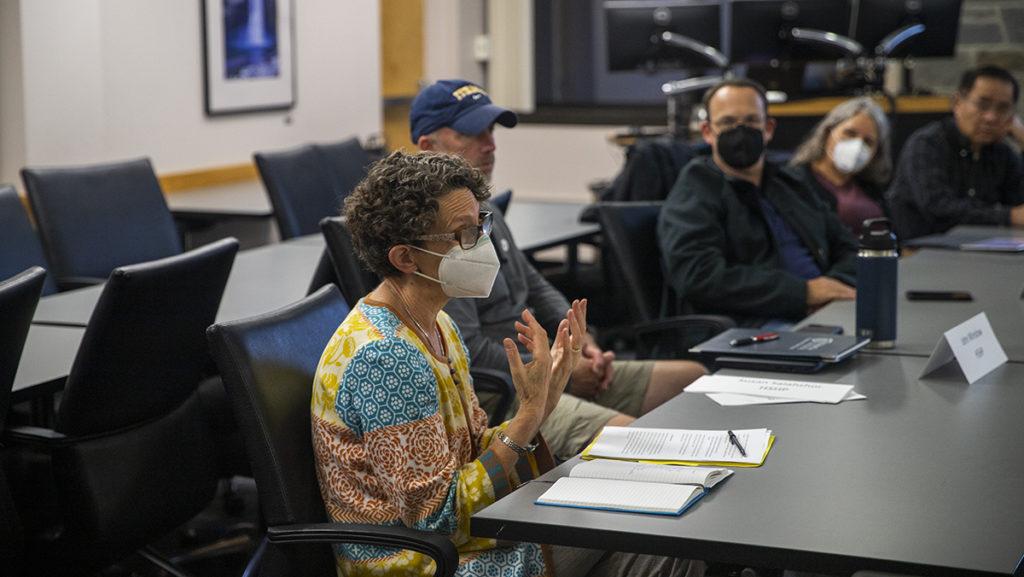The Ithaca College Faculty Council reconvened for the first time for the 2022–23 academic year Sept. 6 and discussed issues covered throughout the 2021-22 academic year, like shared governance and student retention rates. The Council also considered what impacts the morale of the faculty.
Melanie Stein, provost and senior vice president, said members of the Ithaca College Board of Trustees attended a meeting where they discussed a higher education model of shared governance.
“Since most board members come from corporate careers, the higher ed tradition is really quite different from their experience,” Stein said. “So this presentation basically presented and reviewed the roles and responsibilities of all the constituencies in an academic setting, namely the board, the administration, the faculty, the students and the staff.”
Stein said she hopes to have a retreat this year for the leaders of the many constituencies, like the board of trustees, administration, faculty, students and staff, who together will develop a shared value for the college.
Steven Gordon, associate professor in the Department of Media Arts, Sciences and Studies, said the relationship between the faculty and the board needs improvement.
“We’re not sure the board fully trusts the faculty,” Gordon said. “We need to find a way to get them back in our courts and respect what we have to offer.”
Gordon also noted causes of low faculty morale, like the decreasing of the faculty’s benefits. Gordon said the college’s dental plan only covered $10 of his $240 trip to the dentist. Gordon said it is still unclear if the change in dental coverage benefits any of the faculty.
In Spring 2022, the college reduced coverages for dentists by 10%. The college also aligned the amount it was reimbursing for both in-network and out-of-network services, causing a noteworthy change in reimbursements.
Vadim Serebryany, associate professor in the Department of Music Performance, said faculty morale was also impacted by program cuts, which had an impact on the quality of professors’ work experience. Serebryany said he left his previous job, where he was tenured, because he desired to work with graduate students, a wish he could fulfill at the college.
“The loss of graduate students has been felt by people on campus: students and faculty,” Serebryany said. “Our grad students contributed tremendously to the experience of both students and faculty.”
Five graduate programs were recommended to be cut by the Academic Program Prioritization Implementation Committee: M.M. in Performance, Conducting, Composition, and Suzuki Pedagogy and String Performance.The APP included the removal of 116 full-time equivalent faculty positions and 26 majors, departments and programs.
Rachel Schutz, assistant professor in the Department of Music Performance, said faculty cuts have resulted in an increased teaching load.
“A lot of my colleagues are asking how we can be expected to offer the same materials … when professional scholarship does not seem to be a part of the description anymore,” Schutz said.
Stein said the college took the faculty and student census Sept. 6 and the college has exceeded the expected number of total students. Stein said the census is a number that changes every day, so seeing what it is at the end of the year is more telling than the current estimate.
The Faculty Council has discussed retention rates in past meetings. In a Spring 2022 meeting, the council met with Elizabeth Bleicher, dean for Student Success and Retention Strategy, who said the college should focus on retaining its students in order to combat low enrollment rates. Her presentation noted the School of Business had the lowest retention rate of 75.3%, while the School of Music had a retention rate of 90.5%.
The college has seen a decrease in enrollment throughout recent years. In Fall 2021, 5,239 students were enrolled at the college, while 5,354 were enrolled in Fall 2020. Retention rates have also decreased over the years. In 2017, the fifth semester retention rate was 77.3%, but by 2019 it dropped to 76.1%.
Serebryany said the college lowered its admission standards as a way to increase enrollment, but it impacted the retention rate of students and the quality of the classroom.
“Lowering the admission standards ended up resulting in the administration pointing the blame at faculty for lower retention,” Serebryany said. “You admit more students who are less prepared for college in order to cover budgetary problems, those students don’t persist and someone has to get blamed. So I think this sort of fear contributes also to morale.”









